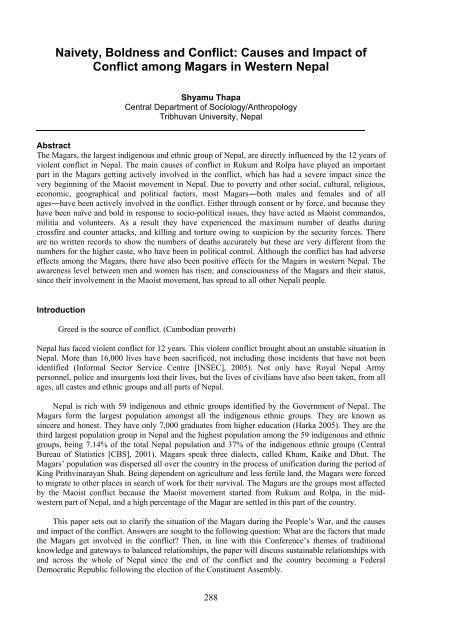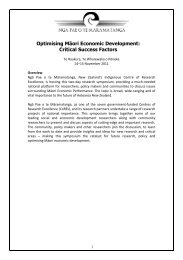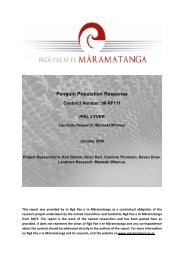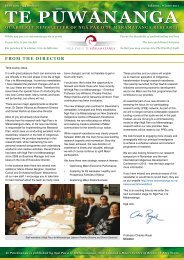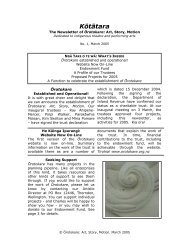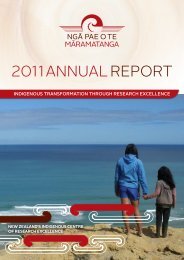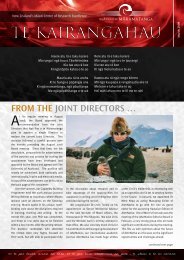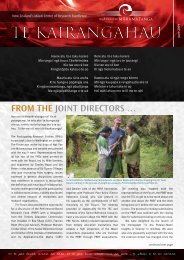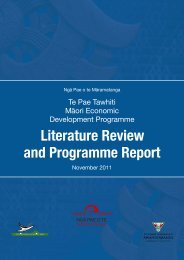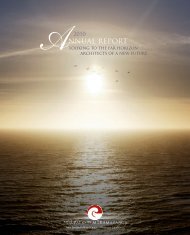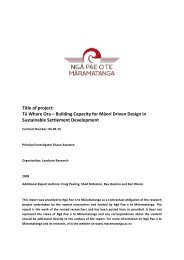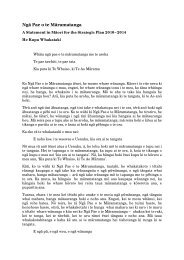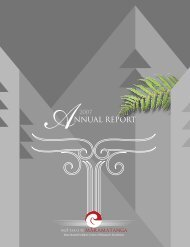traditional knowledge conference 2008 te tatau pounamu
traditional knowledge conference 2008 te tatau pounamu
traditional knowledge conference 2008 te tatau pounamu
Create successful ePaper yourself
Turn your PDF publications into a flip-book with our unique Google optimized e-Paper software.
Naivety, Boldness and Conflict: Causes and Impact ofConflict among Magars in Wes<strong>te</strong>rn NepalShyamu ThapaCentral Department of Sociology/AnthropologyTribhuvan University, NepalAbstractThe Magars, the largest indigenous and ethnic group of Nepal, are directly influenced by the 12 years ofviolent conflict in Nepal. The main causes of conflict in Rukum and Rolpa have played an importantpart in the Magars getting actively involved in the conflict, which has had a severe impact since thevery beginning of the Maoist movement in Nepal. Due to poverty and other social, cultural, religious,economic, geographical and political factors, most Magars―both males and females and of allages―have been actively involved in the conflict. Either through consent or by force, and because theyhave been naïve and bold in response to socio-political issues, they have ac<strong>te</strong>d as Maoist commandos,militia and volun<strong>te</strong>ers. As a result they have experienced the maximum number of deaths duringcrossfire and coun<strong>te</strong>r attacks, and killing and torture owing to suspicion by the security forces. Thereare no writ<strong>te</strong>n records to show the numbers of deaths accura<strong>te</strong>ly but these are very different from thenumbers for the higher cas<strong>te</strong>, who have been in political control. Although the conflict has had adverseeffects among the Magars, there have also been positive effects for the Magars in wes<strong>te</strong>rn Nepal. Theawareness level between men and women has risen; and consciousness of the Magars and their status,since their involvement in the Maoist movement, has spread to all other Nepali people.IntroductionGreed is the source of conflict. (Cambodian proverb)Nepal has faced violent conflict for 12 years. This violent conflict brought about an unstable situation inNepal. More than 16,000 lives have been sacrificed, not including those incidents that have not beenidentified (Informal Sector Service Centre [INSEC], 2005). Not only have Royal Nepal Armypersonnel, police and insurgents lost their lives, but the lives of civilians have also been taken, from allages, all cas<strong>te</strong>s and ethnic groups and all parts of Nepal.Nepal is rich with 59 indigenous and ethnic groups identified by the Government of Nepal. TheMagars form the largest population amongst all the indigenous ethnic groups. They are known assincere and honest. They have only 7,000 gradua<strong>te</strong>s from higher education (Harka 2005). They are thethird largest population group in Nepal and the highest population among the 59 indigenous and ethnicgroups, being 7.14% of the total Nepal population and 37% of the indigenous ethnic groups (CentralBureau of Statistics [CBS], 2001). Magars speak three dialects, called Kham, Kaike and Dhut. TheMagars’ population was dispersed all over the country in the process of unification during the period ofKing Prithvinarayan Shah. Being dependent on agriculture and less fertile land, the Magars were forcedto migra<strong>te</strong> to other places in search of work for their survival. The Magars are the groups most affec<strong>te</strong>dby the Maoist conflict because the Maoist movement star<strong>te</strong>d from Rukum and Rolpa, in the midwes<strong>te</strong>rnpart of Nepal, and a high percentage of the Magar are settled in this part of the country.This paper sets out to clarify the situation of the Magars during the People’s War, and the causesand impact of the conflict. Answers are sought to the following question: What are the factors that madethe Magars get involved in the conflict? Then, in line with this Conference’s themes of <strong>traditional</strong><strong>knowledge</strong> and ga<strong>te</strong>ways to balanced relationships, the paper will discuss sustainable relationships withand across the whole of Nepal since the end of the conflict and the country becoming a FederalDemocratic Republic following the election of the Constituent Assembly.288


